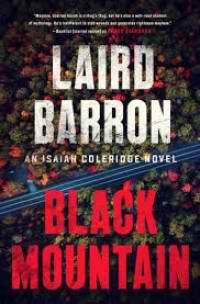
Published by G.P. Putnam's Sons on May 7, 2019
Isiah Coleridge, the retired Maori hitman who made his debut in Blood Standard, returns in Black Mountain. An underworld acquaintance asks Coleridge to look into the gruesome murder of Henry Lee, who collected debts for loan sharks. Coleridge’s investigation causes him to suspect that the murder was committed by a legendary and particularly evil mob hitman, now a septuagenarian, who may have spent his retirement years as a serial killer. Except that the police believe the hitman, known to the world as the Croatoan, died in an explosion many years earlier. So is there a new hit man, is the Croatoan still hitting, or is there another answer to the puzzle? The answer is satisfyingly grim and the novel’s ending is satisfying gruesome.
Coleridge enlists the help of his buddy Lionel and begins a search for Lee’s killer. In a subplot, he also helps (or at least annoys) a young woman named Aubrey who is being stalked by the ex-girlfriend of her current boyfriend. (Aubrey’s grandfather has a gym where Coleridge polishes his boxing skills; hence Coleridge’s involvement.)
Coleridge’s primary investigation leads to corporate shenanigans fostered by the greedy family that controls the corporation (perhaps modeled on the Sackett family, although there are plenty of other real-world examples). The shenanigans date back to a bogus scientific expedition in the Catskills. Nearly all of the scientists and students who participated have met with an unfortunate end. The investigation branches in other interesting directions, as well, providing ample opportunities for confrontations, threats, fights, shootings, and the generalized mayhem that Coleridge seems to attract.
“Contract killers have feelings. Fewer than most, but feelings nonetheless.” Coleridge isn’t what you’d call a sensitive guy but he doesn’t like being judged. He has his own moral code and a strong sense that evil is a force from which he stands apart, even when he feels its influence. It’s hard not to like him, his propensity for violence notwithstanding.
Apart from strong characterization, the two Coleridge novels benefit from smarter and sharper prose than is typical of crime novels. Coupled with entertaining plots, I can find little to criticize about this unique series.
RECOMMENDED